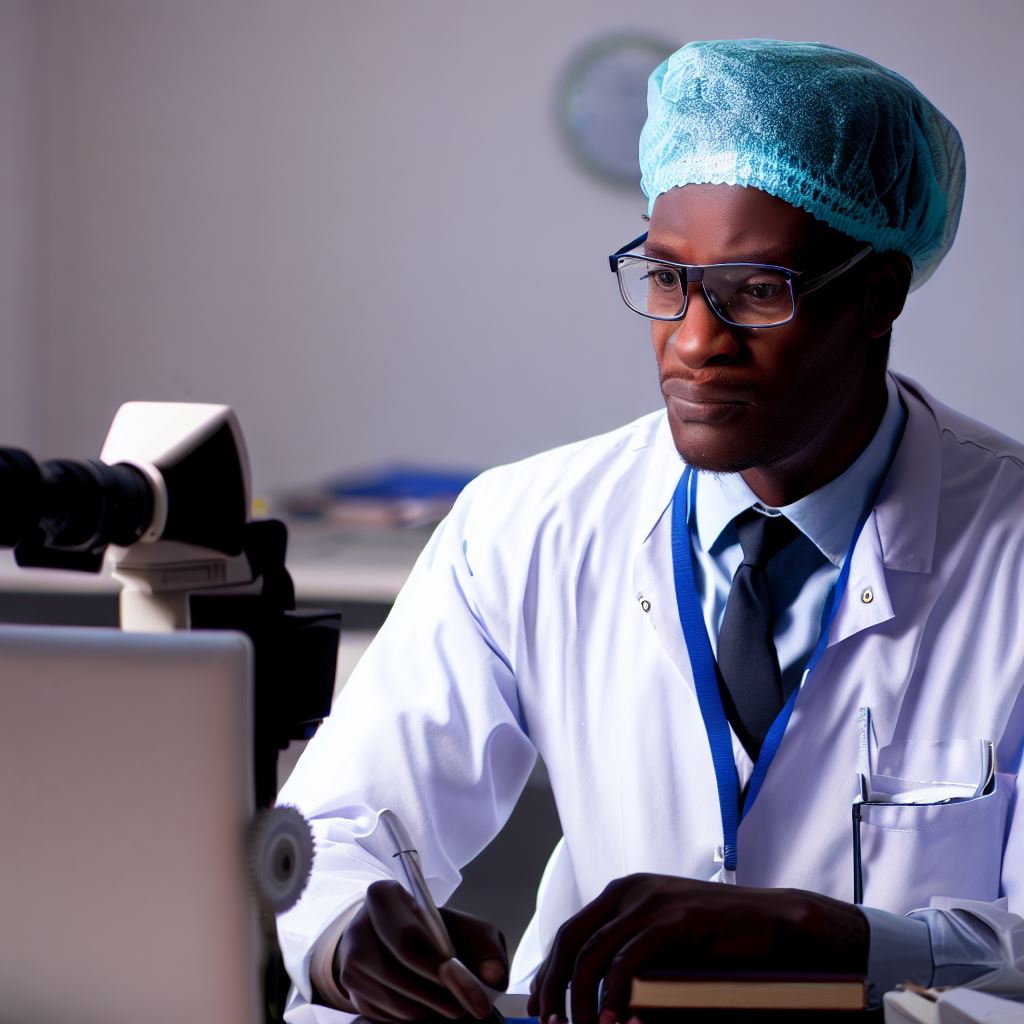Introduction
Biostatisticians, the unsung heroes of healthcare, analyze and interpret data to drive informed medical decisions.
Their expertise ensures the accuracy and reliability of research findings, influencing patient care and treatment outcomes.
In the Nigerian healthcare landscape, biostatisticians play a pivotal role in shaping policies, enhancing healthcare delivery, and advancing medical research.
Nigeria’s healthcare system, a complex web of public and private institutions, faces unique challenges, from limited resources to pressing public health issues.
Biostatisticians are instrumental in harnessing data to address these challenges, guiding healthcare professionals toward evidence-based practices.
Their work extends to disease surveillance, clinical trials, epidemiological studies, and healthcare policy development.
With a growing population and diverse health needs, Nigeria relies on biostatisticians to navigate complex healthcare scenarios.
In this section, we explore biostatisticians’ vital role in Nigerian healthcare, enhancing public health and medical research.
Educational Background and Skills
A. Educational Requirements for Becoming a Biostatistician
- A bachelor’s degree in statistics or a related field is typically required.
- Some positions may require a master’s or doctoral degree in biostatistics or statistics.
- It is important to choose a reputable educational institution that offers relevant courses.
- Coursework in mathematics, statistics, biology, and computer science provides a strong foundation.
- Internships or practical experience in the field can also be beneficial for career advancement.
B. Necessary Skills and Knowledge in Statistical Analysis and Healthcare Research
- A biostatistician should have a strong background in statistical methods and data analysis.
- Proficiency in programming languages like R or SAS is necessary for data manipulation and analysis.
- Knowledge of study design and research methodologies is essential for conducting healthcare research.
- Biostatisticians need to have excellent critical thinking and problem-solving skills.
- Effective communication skills are vital for presenting findings and collaborating with healthcare professionals.
C. Importance of Continuous Learning and Professional Development
- Continuous learning is crucial for biostatisticians to stay updated with advances in statistical methods.
- Attending conferences and workshops allows professionals to network and learn from experts in the field.
- Keeping up with scientific literature helps biostatisticians remain informed about research breakthroughs.
- Continuing education courses and certifications provide opportunities for skill enhancement and career progression.
- Engaging in professional organizations fosters collaboration and knowledge exchange among biostatisticians.
Overall, a career as a Nigerian biostatistician demands rigorous education, continuous learning, and a passion for statistical analysis and healthcare research.
By obtaining qualifications and developing skills, biostatisticians significantly contribute to enhancing healthcare outcomes and evidence-based medical practices.
Read: Healthcare Impact of Biostatisticians in Nigeria
Work Environment
A. Typical workplace setting for a Nigerian biostatistician
- Nigerian biostatisticians work in a variety of settings, including universities, research institutes, and government agencies.
- The workplace is often a combination of office spaces, research laboratories, and statistical analysis rooms.
- It is common for biostatisticians to have their own workstations equipped with computers and statistical software.
- The environment is generally professional and focused, with an emphasis on research and data analysis.
- The workspace may also include collaborative areas for discussions and meetings with other team members.
B. Collaborative nature of the work and interactions with other healthcare professionals
- Biostatisticians regularly collaborate with healthcare professionals, including doctors, epidemiologists, and researchers.
- They work together to design studies, collect data, and analyze findings to improve public health.
- Interactions often occur through face-to-face meetings, emails, and video conferences.
- Effective communication is crucial to ensure a comprehensive understanding of research objectives and data analysis goals.
- Biostatisticians provide statistical expertise and insights to healthcare professionals, enhancing their decision-making process.
C. The use of technology and software in biostatistics
- Technology plays a central role in the work of Nigerian biostatisticians, allowing for efficient data collection and analysis.
- Statistical software such as R, SPSS, and SAS are commonly used for data management and analysis.
- These software programs enable biostatisticians to perform complex statistical calculations quickly and accurately.
- Technology also facilitates the visualization of data through graphs, charts, and statistical graphics.
- Biostatisticians rely on technology to present their findings to other healthcare professionals and policymakers.
In fact, a Nigerian biostatistician’s workplace setting comprises various environments, including offices and research laboratories.
Collaboration with other healthcare professionals is vital, and interactions occur through meetings and communication channels.
The use of technology and software, such as statistical analysis tools, is integral to efficient data management and analysis in biostatistics.
Read: The Role of Biostatisticians in Nigeria’s Pharma
Transform Your Career in Nigeria
Discover unmatched expertise with our personalized Career Consulting service. Navigate Nigeria’s job market with a strategy tailored just for you.
Get Started
Daily Responsibilities
A. Various tasks performed by Nigerian biostatisticians
- Conducting statistical analysis of health-related data.
- Developing statistical models and methodologies for medical research.
- Providing guidance on sample size determination and power calculations for research studies.
- Collaborating with researchers to design studies and determine appropriate statistical methods.
- Performing statistical programming using software like R or SAS to analyze data.
- Interpreting and presenting statistical findings to researchers and other stakeholders.
- Verifying the accuracy of data collected for research projects and ensuring data quality.
- Assessing the validity and reliability of study instruments and questionnaires.
- Conducting literature reviews to inform research design and methodology decisions.
- Contributing to the development and review of research protocols and grant proposals.
B. Designing research studies and choosing appropriate statistical methods
- Collaborating with researchers to identify research objectives and formulate research questions.
- Designing appropriate study designs, such as randomized controlled trials or cohort studies.
- Determining the sample size needed to achieve statistical power.
- Selecting the most suitable statistical methods based on study design and data type.
- Considering various factors like bias, confounding, and effect modification in study design.
- Advising on the selection and use of statistical software for data analysis.
- Providing consultation on statistical aspects of study protocols and research proposals.
- Ensuring adherence to ethical standards and data protection regulations in study design.
- Performing sensitivity analyses to assess the robustness of study findings.
- Assessing the appropriateness of statistical assumptions and addressing violations if necessary.
C. The process of data collection, management, and analysis
- Developing data collection tools, such as questionnaires or electronic data capture systems.
- Ensuring the accuracy and completeness of collected data through quality control measures.
- Conducting data cleaning and preprocessing to prepare data for analysis.
- Creating data management plans to organize and document data sources and processes.
- Implementing appropriate data storage and security measures to protect sensitive information.
- Applying statistical techniques to analyze data and generate meaningful insights.
- Interpreting statistical results in the context of the research question and study objectives.
- Presenting data and statistical findings through tables, graphs, charts, and reports.
- Collaborating with interdisciplinary teams to integrate statistical analysis into research projects.
- Contributing to the writing of scientific articles and reports based on the analyzed data.
Read: Certification Paths for Biostatisticians in Nigeria
Find Out More: The Impact of Food Scientists on Nigerian Agriculture
Challenges and Rewards
A. Challenges faced by Nigerian biostatisticians
- Limited collaboration with healthcare professionals restricts the application of statistical expertise.
- Lack of recognition and appreciation for biostatisticians’ contributions undermines motivation and professional growth.
- Limited career opportunities within the healthcare system lead to a talent drain and underutilization of skills.
- Biostatisticians struggle with outdated healthcare policies that fail to harness their potential effectively.
- Inconsistent funding for biostatistical research impedes the advancement of medical knowledge.
- Navigating bureaucratic hurdles and red tape delays research projects and data collection efforts.
- A shortage of formal training programs in biostatistics limits the development of skilled professionals.
- Biostatisticians often encounter skepticism about their value and relevance within the healthcare sector.
- The absence of a unified platform for biostatisticians to network and collaborate hinders knowledge exchange.
- These challenges hinder utilizing biostatistics to improve healthcare outcomes in Nigeria.
B. Importance of accuracy and attention to detail in statistical analysis
- Statistical analysis in healthcare research requires precision and attention to detail.
- Accurate analysis impacts the validity and reliability of research findings.
- Meticulous data cleaning and outcome measurement minimize biases and enhance results.
- Biostatisticians play a critical role in ensuring accurate and unbiased interpretation of data.
C. The satisfaction and sense of accomplishment derived from contributing to healthcare research
- Contributing to healthcare research brings immense satisfaction and a sense of purpose.
- Biostatisticians’ work directly impacts the development of effective healthcare interventions.
- They contribute to the improvement of public health outcomes and contribute to saving lives.
- Being part of groundbreaking discoveries and advancements in healthcare is highly rewarding.
- The opportunity to make a lasting impact on public health brings a sense of accomplishment and fulfillment.
Impact on Healthcare
A. Contribution of Biostatisticians to Evidence-Based Decision Making in Healthcare
Biostatisticians play a major role in providing evidence-based decision making in healthcare.
They collect, analyze, and interpret data to uncover patterns, trends, and associations that help inform healthcare decisions.
By applying statistical methods, biostatisticians help healthcare professionals make informed choices based on reliable evidence.
They design and conduct clinical trials and studies to evaluate the effectiveness and safety of new treatments and interventions.
B. Role of Biostatistics in Improving Patient Outcomes and Healthcare Policies
Biostatistics is essential in improving patient outcomes and shaping healthcare policies.
Through data analysis, biostatisticians identify risk factors, develop predictive models, and assess the impact of interventions on patient outcomes.
They provide crucial insights into disease patterns, treatment effectiveness, and healthcare resource allocation.
Biostatisticians also evaluate the quality of healthcare services and identify areas for improvement.
The findings derived from biostatistical analyses contribute to the development of evidence-based guidelines and policies.
C. Examples of Successful Studies Conducted by Nigerian Biostatisticians
Nigerian biostatisticians have conducted remarkable studies that have made substantial contributions to healthcare.
- In a study on malaria control, biostatisticians analyzed data from a large sample of patients to assess the effectiveness of different interventions.
- Their findings helped develop targeted strategies for malaria prevention, ultimately reducing the disease burden in Nigeria.
- Another study focused on HIV/AIDS prevalence in Nigeria. Biostatisticians analyzed data from multiple sources to estimate the prevalence and monitor trends.
- Their findings provided essential information for policymakers to allocate resources and design effective prevention and treatment programs.
- Additionally, Nigerian biostatisticians have conducted studies on non-communicable diseases such as diabetes and hypertension.
- Their research has led to improved understanding of risk factors and helped develop interventions to reduce the burden of these diseases.
- These successful studies demonstrate the invaluable role of Nigerian biostatisticians in generating evidence and informing healthcare decision making.
In essence, biostatisticians actively contribute to evidence-based decision making in healthcare.
Through data analysis and statistical methods, they support the development of improved patient outcomes and healthcare policies.
Nigerian biostatisticians have conducted impactful studies, making significant contributions to disease control and prevention.
Their work exemplifies the critical role of biostatistics in shaping the future of healthcare in Nigeria and beyond.
Read: Ethical Considerations for Biostatisticians in Nigeria
Conclusion
In this blog post, we delved into the daily life of a Nigerian biostatistician, shedding light on their invaluable work.
Biostatisticians are the backbone of the Nigerian healthcare system, analyzing and interpreting data to guide critical decisions.
Whether you’re contemplating a biostatistics career or appreciating their vital healthcare role, their work is undeniably significant.
The world of biostatistics is a dynamic one, where data-driven decisions impact public health, medical research, and healthcare policies.
Daily, Nigerian biostatisticians enhance lives by deciphering complex data, spotting trends, and offering evidence-based solutions to their compatriots.
Their dedication not only influences Nigerian healthcare but also contributes globally to disease prevention, treatment, and healthcare enhancement.
As we conclude this exploration into the life of a Nigerian biostatistician, we invite you to recognize and appreciate the vital work they do.
Publish Your Professional Profile, Business or Brand
Showcase your expertise, gain trust, and boost visibility instantly on Professions.ng.
Publish NowConsider the profound impact of their expertise on healthcare outcomes and their commitment to advancing public health.
Perhaps, if you have a passion for data analysis and a desire to make a meaningful difference in healthcare, you might even explore a career in biostatistics.
Regardless of your path, always remember the crucial role biostatisticians play in ensuring that data leads to better health for all.




